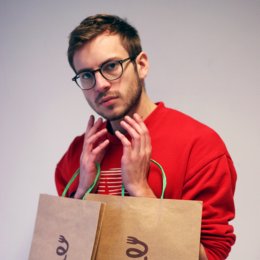I build healthcare applications to make people's lives easier and happier.
Interview with Floris Veldhuizen by Diana Dalenoord
I wanted something to do with engineering, design and art after secondary school. Creative Technology students visited my school and told me what I had to deal with during this programme. I decided on this broad Creative Technology programme. I thought it might be interesting to use existing technology in a way that did not yet exist.
After graduation, I studied for two years at the European Institute of Innovation & Technology (EIT). Within the EIT Digital Master School, I chose Human-Computer Interaction and Design. This is a two-year programme in which you fulfil one year within UT and one year abroad. My second year took place at the University of Berlin. For me, this was a tricky decision, as my disease cystic fibrosis means it is always a worry whether I will end up in the right living conditions. I went from a familiar and healthy environment to an unfamiliar one. Unfortunately, my health failed so I returned to the Netherlands. I decided to quit EIT Digital and switch to the Interaction Technology Master. Of course, this programme is a fantastic fit with the Creative Technology programme.
Human-computer interaction
Human-computer interaction is not only very interesting, but it is also one of the most important considerations in any kind of technological development. It was fascinating to be involved in product development for people with disabilities. For example, I worked on a project for blind people. I created a transcriber, an application that makes notes on the board visible, tangible and perceivable through sound and a screen reader. It was great to make it possible for a blind person - whom you worked closely with - could use your application.
A job with a mission
I always knew my job had to mean something so I could improve people's lives through my creative and interactive technology. I found that job at Nedap, a company after my own heart because they provide a perfect work-life balance, time for yourself, and you'll have the opportunity to take on your own projects. There is great appreciation for each other from the team and the philosophy of improving lives naturally appealed to me. I enjoy working within the Healthcare department with great colleagues in a multidisciplinary company where all roles and expertise are important to achieve good product development.
Nedap as an employer
My job at Nedap is Front-End Developer within the Healthcare department. Here, I work on user-visible projects. And it falls fantastically within Nedap's philosophy, but more importantly, mine: 'With a passion for technology, together we make healthcare better and we can make people happier and more successful in their professional lives. I'm obviously working on technology for life, developing technology in such a way that it has a tangible impact on the professional lives of people who seek a targeted approach. And that makes me feel extremely content.
Home care project
Nedap Healthcare’s main product (called ONS) started as a tool to assist in home care. After years of experience and growth, this tool became a combination of different applications that work together to make the life of nurses easier. Within Nedap healthcare there are different teams that build specific parts of this product, I personally work in the dossier team. The dossier is a central part of ONS, where protected data and records of patients are kept.
Building this software is a challenge because you work with sensitive data and want to make sure that care workers get all the important information they need to provide care, without having to spend time to find it. This is a pattern in designing software for ONS - It’s important for care workers to be able to focus on giving care and tending to their patients, while we take care of the administrative and boring side of their job. A saying we have is “the less time users spend with our product, the better of a job we did!” because this means that all their time can be spent providing effective care. By streamlining the administrative side of healthcare, the job satisfaction of the home care staff is greatly enhanced.
Acquired expertise
My expertise comes mostly from my education where I learned a lot about programming and UX, how to talk to clients about their needs and determine where those needs come from and how you can translate them into a project. You are also the link between the different experts so that they see how they can contribute to the project with their expertise. The link with CreaTe is of course prototyping, simplifying a system, seeing how it works, adapting it and testing it again. And don't forget to work in teams. Success in business comes from working with colleagues with their own areas of expertise. Nobody has all the knowledge to carry out a project on their own. And that, of course, is what makes it so much fun.
About Floris
During his student days, Floris was not only busy with his studies but was also engaged in bouldering - climbing on walls up to 4m high, without a rope, climbing harness, or other aids. You could also regularly see him riding around campus on his longboard. Besides helping out at Open Days, Student for a Day, CreaTe Kick-In and joining Proto activities, he also co-founded Picobelly with a fellow student. An interactive website where cooks can offer food to those who cannot or do not want to cook. This project has been a real success, you can find them online!

